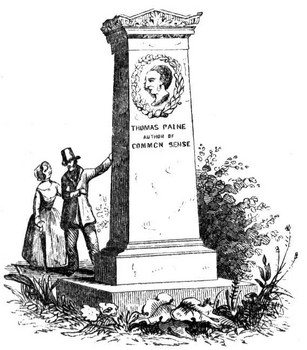Part 2: From Hero to Outcast When the newly minted and defended United States began to function as independent nation, free from military strife, Paine went back to his contrary ways, returning to Europe. This time, he wanted to be an inventor. One of the things he worked on was a smokeless candle.
Paine escaped England and went to France, to join the Revolution. When King Louis XVI was killed, Paine found himself on the wrong end of public opinion again when he didn't approve of the killing. He was thrown in prison (as was common in those days for anyone who didn't shout out publicly their support of everything the Reign of Terror government was doing). The year was 1793, and Thomas Paine was in prison, perhaps on a list of people to be executed. He was writing again, this time the beginning of another master work, The Age of Reason. He was freed in 1794 after James Monroe, the U.S. Minister to France, used all his influence on the Revolutionary government. Paine, however, chose to remain in France. He survived further threatening situations and stayed in France until 1802, when he accepted an invitation from then-President Thomas Jefferson to return to America. He didn't exactly receive a hero's welcome, however, since his latest work, The Age of Reason (published in 1794-1796) proved to his most controversial. In this series of writings, he argued against the practice of religion as observed by nearly everyone in America. He argued that the Bible should be examined by each person critically. This was certainly a novel view in those times, and it proved very unpopular with his fellow Americans. Many of the people who read his writings (or, more accurately, heard from other people what he had written) found themselves unwilling to Paine died alone in New York City on June 8, 1809. He was gone and forgotten by many who had formerly called him friend and inspiration. But his writings live on after him, especially Common Sense and The Crisis. To many then and now, Thomas Paine was the voice of the American Revolution. First page > Failures and Success > Page 1, 2 |
|
Social Studies for Kids
copyright 2002–2026
David White



 After he had been in Europe for a few years, the French Revolution began. An ardent believer in the rights of the people, Paine supported the cause of the French revolutionaries. When Englishman Edmund Burke issued a widely publicized criticism of the French Revolution (
After he had been in Europe for a few years, the French Revolution began. An ardent believer in the rights of the people, Paine supported the cause of the French revolutionaries. When Englishman Edmund Burke issued a widely publicized criticism of the French Revolution ( forgive him, despite his heroic writings during the American Revolution. He continued to write, though, among other things against the beliefs of the
forgive him, despite his heroic writings during the American Revolution. He continued to write, though, among other things against the beliefs of the 
